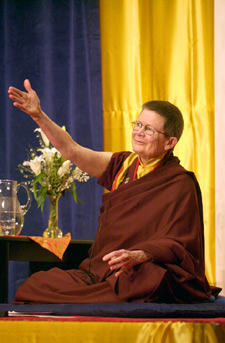How not to get hooked:
Noted Buddhist teacher visits Harvard to urge courage in everyday life

Many people imagine that Buddhist meditation aims at tranquility as an escape from the emotional pangs of everyday life. Not so, says author and teacher Pema Chödrön. “My word for the Buddhist path is courage,” Ani Pema told an audience of 1,600 in the Memorial Church on Friday evening (Dec. 6). “Tranquility is a lucky side effect.”
Ani Pema (ani is a Tibetan honorific) lives and teaches at Gampo Abbey in Cape Breton, Nova Scotia. An early student of Chögyam Trungpa Rinpoche – the late Tibetan meditation master who gained a large Western following in the 1970s – she was one of the first Americans ordained in the Kagyü lineage of Tibetan Buddhism. Her books include “The Wisdom of No Escape,” “Start Where You Are,” “When Things Fall Apart,” and “The Places That Scare You.”
The titles alone evoke her message: that the courage to stay open to all immediate experience, even the most painful and difficult moments, is, in Tibetan Buddhism, the beginning of wisdom and compassion for oneself and others.
At the Friday night talk, open to the general public, Ani Pema urged listeners to recognize shenpa, a preverbal first reaction to any situation – an “uh-oh” moment when “you feel yourself getting ‘hooked’ in a very familiar way.” To interrupt the chain of habitual reaction and the suffering it causes, “we have to catch that moment and stay with it. We don’t want to. It’s almost as though, as a species, we’re genetically programmed to run away.” When we do, she added, we create karma: “The more you try to get away the more you strengthen the dysfunctional habits, and the more you strengthen them the more you run from them.

As a method of working with and opening to such moments, Ani Pema teaches the meditation practice of tonglen, or sending and taking, in which one visualizes breathing in suffering and breathing out openness. Three styles of tonglen – for oneself (“the courage of the benign monarch”), for oneself along with others who are in the same boat (“the courage of the ferryman”), and for others alone (“the courage of the shepherdess”) – were the focus of a fuller weekend retreat, “The Three Kinds of Courage: Teachings on Tonglen and Fearlessness,” which continued through Saturday and Sunday.
The retreat was co-sponsored by the Memorial Church, Gampo Abbey, and the Boston Shambhala Center.




